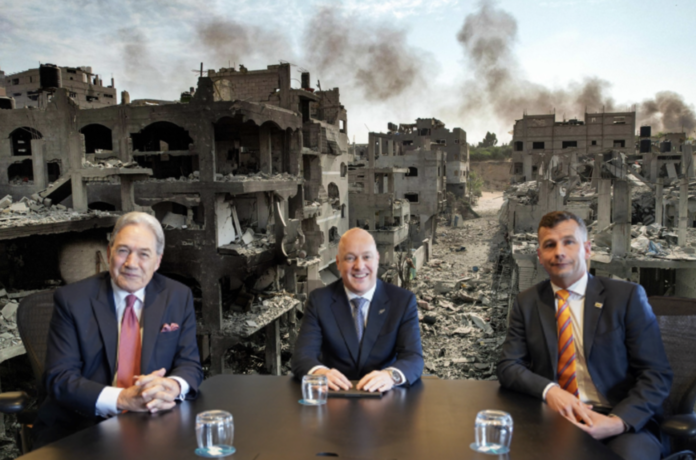New Zealand is reshaping its foreign policy via the Middle East.
A decision to provide intelligence support for future US and UK airstrikes on Yemen is highly symbolic.
The Prime Minister, Christopher Luxon, announced the deployment of the New Zealand Defence Force (NZDF) troops to support the US-led military response to the attacks on commercial shipping from Houthis in Yemen that began on November 19.
In announcing the contribution, Luxon played down its uniqueness, saying ‘choosing to support action in the Middle East is not unusual for New Zealand’. This was immediately echoed by his foreign minister, Winston Peters, who argued the ‘support for maritime security in the Middle East is not new’.
A ‘fact sheet’ released by the Government compared the NZDF contribution to other multilateral efforts in the Middle East such as the UN Truce Supervision Organisation (UNTSO) mission that has been ongoing since 1954.
The fact sheet also pointed to New Zealand’s role in the Bahrain-based Combined Maritime Forces (CMF), a mission for which Wellington has provided support in some form since 2008 and continuously since 2013.
The CMF brings together 40 countries in four separate Combined Task Forces (CTF). While all of these overlap to some extent, New Zealand has traditionally focused its contribution of up to 12 personnel on CTF 150, which concentrates more on criminal activities such as piracy, narcotics and smuggling.
To date, New Zealand has not been involved in CTF 153, ‘Red Sea Maritime Security’, a relatively new mission that was established in April 2022. CTF 153 is now serving as the umbrella for ‘Operation Prosperity Guardian’, a new naval patrol mission involving over 20 countries announced in December by US Defence Secretary Lloyd Austin.
New Zealand’s announcement made no mention of Operation Prosperity Guardian.
Instead, the NZDF contribution appears to be for the much smaller and far more elite coalition that is backing joint US-UK airstrikes on Yemen.
US Central Command (Centcom) listed Australia, Bahrain, Canada and the Netherlands as support partners for a second round of joint US-UK airstrikes conducted earlier this week.
They are the same countries that participated in the first wave of joint airstrikes, against 60 Houthi targets, on January 11.
New Zealand signed a joint statement in support of that operation, but was not otherwise involved in it.
Following Tuesday’s announcement, New Zealand can now expect to be included on the list of supporting countries for future airstrikes. So far, the aim of these has been to destroy Houthi infrastructure such as missile systems, radar units and other military facilities.
In between the joint missions, the US has also conducted smaller airstrikes against Houthi infrastructure on its own, according to Centcom.
The bombings constitute the sharper, more hawkish end of Washington’s military response to the Houthis.
Luxon suggested on Tuesday that New Zealand’s contribution would be intelligence-related and would support ‘precision targeting’ in any future airstrikes.
To some extent this will be driven simply by New Zealand’s limited capabilities, given that Wellington disbanded the combat wing of its airforce in 2001.
Still, while New Zealand’s efforts will be small and almost certainly desk-bound, they are in a very different league to New Zealand’s long-running peacekeeping efforts in Egypt and Lebanon, or even the largely deterrence-driven naval mission based out of Bahrain.
Put simply, New Zealand will be one of just a handful of countries that are bombing Yemen.
As Richard Harman points out, many countries willing to participate in Operation Prosperity Guardian, such as Singapore, are staying well away from involvement in the airstrikes.
The military involvement represents a huge shift for New Zealand’s independent foreign policy – and is uncharted territory when it comes to the Middle East.
Unlike Australia, New Zealand strongly opposed the US-led invasion of Iraq in 2003.
Wellington did deploy troops to the anti-ISIS coalition in February 2015 – with then Prime Minister John Key shouting at opponents in Parliament to ‘get some guts and join the right side’.
But that operation was at the invitation of the Iraqi government – and New Zealand was joining a broad-based international coalition that brought together dozens of countries from the outset.
On Tuesday, Winston Peters forcefully rejected any connection between New Zealand’s new military contribution and the war in Gaza, saying ‘any suggestion our ongoing support for maritime security in the Middle East is connected to recent developments in Israel and the Gaza Strip, is wrong’.
However, the Houthis have clearly linked their attacks with the war in Gaza and have pledged to continue for as long as the war goes on.
There is little doubt that the war between Hamas and Israel is exacerbating conflict throughout the Middle East – with outbreaks of tit-for-tat attacks happening everywhere from Lebanon to Pakistan.
On the Arab street, there has been an outpouring of sympathy and solidarity for the Palestinian cause – matched in equal measure by anger towards Israel.
While the airstrikes on Yemen may help international shipping in the very short term, they will also galvanise support for the Houthis.
Ultimately, the root causes of the instability will need to be addressed if there is to be any sustainable solution.
This includes Yemen’s own disastrous humanitarian situation, following years of civil war, but also the war in Gaza and the lack of a solution to the Israeli-Palestinian conflict.
Shortly before the New Zealand military contribution to the Yemen airstrikes was announced, Peters posted on X that ‘New Zealand is deeply concerned at recent comments by members of the Israeli Government that fuel tensions & imperil the two state solution. New Zealand has always supported a two state solution – and has consistently engaged w/Israel & the Palestinians on that basis’.
https://twitter.com/NewZealandMFA/status/1749538284873912591
Peters’ diagnosis of the need for a long-term, two-state political solution is not wrong – and New Zealand’s good reputation in the Middle East and its traditionally independent stance still puts Wellington in a good position to play a small, yet very useful diplomatic role.
But as New Zealand backs the airstrikes against the Houthis, the window of opportunity to take the dialogue and de-escalation pathway may be gradually closing.
It is hard to overstate the significance of New Zealand’s new military deployment to the Middle East.
The troop numbers are small – but the potential ramifications are enormous.
Wellington is drawing a line in the sand.
And it could be the beginning of the end for New Zealand’s independent foreign policy.
Geoffrey Miller is the Democracy Project’s geopolitical analyst and writes on current New Zealand foreign policy and related geopolitical issues. He has lived in Germany and the Middle East and is a learner of Arabic and Russian. He is currently working on a PhD at the University of Otago on New Zealand’s relations with the Gulf states.





Geoffrey – Iraq Government asked for help with the Houthis…that is interesting
Eh? I think the point was we got involved in Iraq in 2015 at the request of the Iraqi government ( to fight isis). I don’t think Yemen is handing out invitations on this occasion.
Biden shouldn’t be messing around with these things he’s to old for one. We had piracy cornered in those narrow straights after decades Long campaign. Created a corridor with single file so our merger forces can patrol effect now we run the risk of sending piracy to the west coast of Africa where it’s open waters and far more difficult to patrol Biden has no fucken clue.
NZ under the Coalition will end up on the rubbish bin of history along with its historic mentors US and UK imperialism.
The question is how do the majority of working class people avoid being turned into cannon fodder for the survival of the effete, reactionary ruling classes who want us to die so they can continue to rule the world?
Sunak is calling for conscription to fight Russia. Biden is happy to enlist proxy’s and mercenaries like NZ to fight his wars.
There is only one way to stop war and that is to turn it into what it really is , a class war, and disarming and defeating the ruling classes.
Are you feeling ok DB your comments suggest you have problems?
School starts next week.
You are right, he has problems, class war touches everyone all after all. Lucky for you, you are a lackey for the hob nob brigade. For the rest of us ordinary folk though, we have to work out how to stop your mob from dragging everyone else through one of their many meat grinders. Starts with understanding that all politicians are in your mobs pockets. Sooner we can spread this message to the masses, the sooner we can stop the rot.
Lets start the schooling (spreading this message) now!
As long as the warmonger politicians making the decision send their sons and daughter of to fight that’s fine, I bet, they don’t and won’t and why is that?
” Wellington did deploy troops to the anti-ISIS coalition in February 2015 – with then Prime Minister John Key shouting at opponents in Parliament to ‘get some guts and join the right side’. ”
One of many shameful episodes Key was involved in as PM.
” And it could be the beginning of the end for New Zealand’s independent foreign policy. ”
Geoffrey we haven’t had an independent foreign policy since 1987 ! Helen Clark came close with her governments stand on Iraq.
The Americans made sure we suffered for our principled decision to ban nuclear weapons from our sovereign territory and in Lange’s words ” I am proud to have led a government that never went to Washington to grovel and that spirit of an independent foreign policy has to remain.
New Zealand has got down on its knees and grovelled with obsequious behaviour and rhetoric ever since. We were prepared to sell everything not bolted down economically including our self respect and principles.
The fanciful idea of an independent foreign policy is dead.
It is disappointing that the coalition should be so enthusiastic to get caught up in a closer relationship with the US and their explanations for doing so are either naive or simply misleading the Aotearoa NZ public. Have they even considered the implications of trying to pull back should Trump take over the Presidency with his less than stable tactics?
“it could be the beginning of the end for New Zealand’s independent foreign policy.’
When has New Zealand EVER had an independent foreign policy?
Seriously, every major overseas endeavor undertaken by New Zealand has been in support of a plan drawn up in a foreign capital, either London or Washington (and to a certain extent Canberra).
Without an independent capacity the chance of an independent policy is zero.